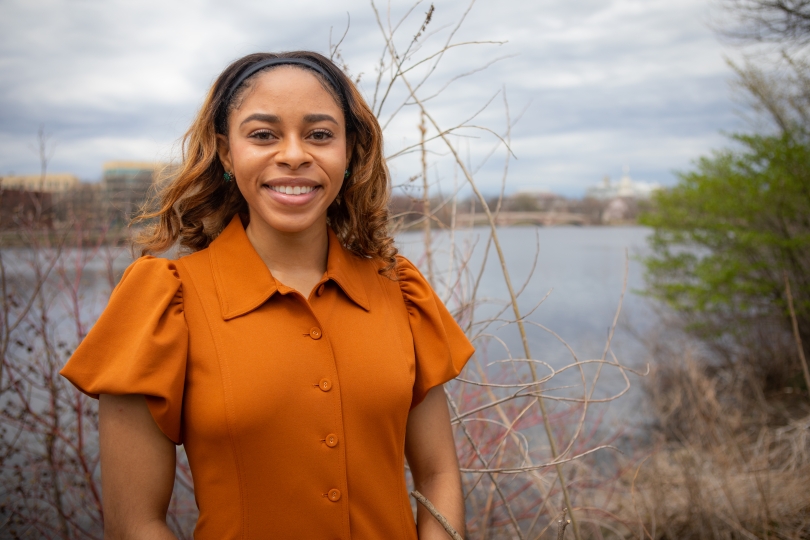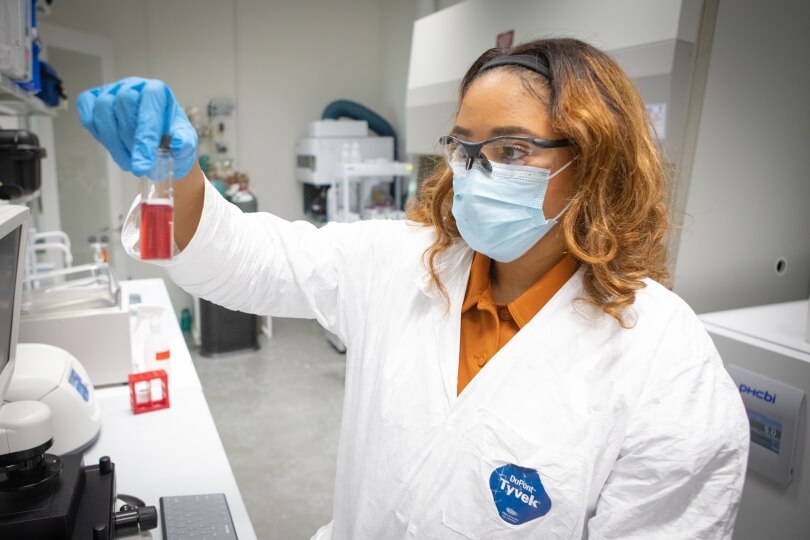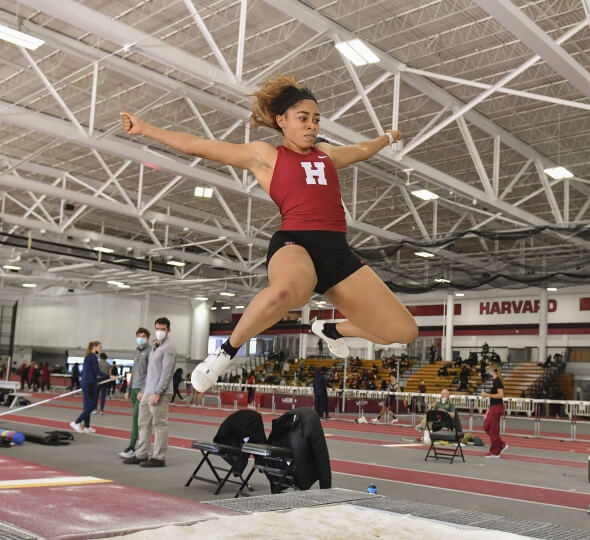DaLoria Boone saw the potential of the Harvard John A. Paulson School of Engineering and Applied Sciences while its flagship building was still under construction. A nationally ranked jumper and sprinter out of the Macon region of Georgia, Boone was taken to see the construction of the new Science and Engineering Complex (SEC) while on a recruiting trip during her junior year of high school.
DaLoria Boone, S.B. '22 in Engineering Sciences: Bioengineering (Eliza Grinnell/SEAS)
Boone knew she was interested in the sciences and seeing the construction of the SEC helped convince her Harvard was where she wanted to be.
“I’ve always been interested in the human body, but I didn’t want to be a doctor,” Boone said. “I wasn’t interested in people getting sick, but how you treat them. I came across what I didn’t know at the time was biomedical engineering. This was exactly what I wanted to study, because I was interested in medicine and pharmaceuticals.”
Now Boone is set to graduate with an S.B. in bioengineering. She’s put her education to use in numerous ways at Harvard, from working in the Harvard Office of Sustainability, to volunteering as an academic peer tutor with the Harvard Academic Resource Center, to being in the Emerging Scholars Program, which works to bring equity, diversity and inclusion to STEM-related fields.
She capped off her studies earlier this month with her senior capstone project, a filtration system that used bacteria to remove manganese from water from the Charles River. She received Honorable Mention recognition for her research earlier this month.
“I wanted something that was attainable, that I could really grasp,” Boone said. “I started looking up major pollutants in water after Active Learning Labs assistant director Glen Andrew de Vera suggested looking into Manganese and other heavy metals, and iron and manganese came up. I was looking up ways to remove manganese, and I came across biological oxidation, which sounded green-friendly.“
For her senior capstone project, DaLoria Boone designed a filtration system to remove manganese from water from the Charles River. She received Honorable Mention recognition for her research earlier this month. (Eliza Grinnell/SEAS)
Boone’s capstone project required many hours in the SEC’s Active Learning Labs. Being a Division I athlete can be so time-consuming – Boone’s track and field commitments can total close to 20 hours in any given week – and those commitments can compete for time with academics. The nature of her work forced her to often prioritize the project.
“It definitely required some compromises,” she said. “At the beginning, I did miss two or three track practices because I’d get stuck in the lab. When you have bacteria, you have to analyze it right away, or it dies or keeps growing and you don’t have correct data.”
She made her outdoor track season debut at an April meet at MIT, winning the long jump. Losing her entire junior year to the pandemic gave Boone a chance to get ahead on her studies, making her senior year and project more manageable.
“When I was at home during the pandemic, I took a bunch of classes,” she said. “That’s really the main reason my project has been so successful, because I had time to sit, analyze, come up with a new solution and then test.”
Boone’s senior thesis combined her interests in bioengineering, environmental engineering, and chemistry. That same environmental consciousness is what drew her to Harvard’s Office of Sustainability, where she was the Resource Efficiency Officer for Adams House.
DaLoria Boone, S.B. '22, competes in the long jump at the Harvard Beantown Challenge indoor track and field meet in January at the Harvard Gordon Track and Tennis Center. (Gil Talbot/Harvard Athletics)
“Any time anybody has any ideas about what they want done at Adams House that’s more sustainable, I talk to the deans, our building manager, anybody that I can get in touch with to make it happen if it seems feasible,” Boone said. “Too much plastic waste was being discarded, so they wanted to find a way to reduce that. They wanted to bring Adams’ composting back, because we weren’t composting at the beginning of the year, as well as applying for grants. Part of our job is to make a year-long project. Mine started during the pandemic, and I looked into sustainable menstruation projects on campus.”
The Ivy League canceled one indoor and two outdoor track and field seasons due to the pandemic, leaving Boone with plenty of NCAA eligibility to continue her athletic career. She plans to continue running at another university, but hasn’t yet decided where.
“I want a master’s degree in engineering, so I’m planning on going to graduate school,” she said. “I probably will stick close to the sciences, maybe getting a master’s degree in engineering management or something in the biological sciences.”
Wherever she goes next, Boone knows Harvard was the right place to spend the last four years.
“I was very nervous coming, but I feel like I learned so much,” she said. “How I think about situations is different now. I tend to analyze things a little more and take everything into consideration, because you never know what you might overlook. And I take my time and plan stuff out more, so I don’t have any wasted efforts.”
Press Contact
Matt Goisman | mgoisman@g.harvard.edu


